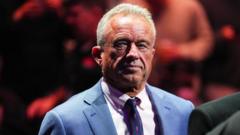Kennedy's controversial methods have raised both support and skepticism as he seeks to reshape food policies amid pushback from the industry and public health experts.
**Can RFK Jr. Transform America's Eating Habits?**

**Can RFK Jr. Transform America's Eating Habits?**
Robert F. Kennedy Jr. aims to overhaul America's health standards by targeting ultra-processed foods and food additives in his potential role under the Trump administration.
Kennedy proposes radical changes to American dietary regulations, arguing that individuals, especially children, are being harmed by the prevalence of ultra-processed foods, food dyes, and additives. He claims that the current food system is betraying public health and wants to address chronic diseases that are exacerbated by these dietary choices.
His aim to become the head of the Department of Health and Human Services (DHHS) is marked by pledges to combat elements he associates with health issues, including advocating for the elimination of highly processed food commonly found in school lunches and making significant changes within the Food and Drug Administration (FDA). Kennedy's approach has drawn a mixture of enthusiasm and caution from both allies and critics, with views sharply divided over the practicality and science behind his assertions.
While some health experts align with Kennedy on the need for reforming food policies, others challenge his views on food safety, particularly his keenness to eliminate additives supported by significant data, and his ongoing dissemination of vaccine misinformation. There's a shared recognition that food reform policies need to navigate complex regulatory landscapes that often encounter rigorous industry resistance.
Kennedy's mission, described by supporters as a necessary awakening in public health policy, also faces the reality of political and administrative hurdles. Observers note that altering established food guidelines and tackling industry giants will require navigating Republican interests and the ingrained practices of agricultural stakeholders.
Public health authorities emphasize the importance of basing food policy in scientific evidence, making Kennedy's controversial health claims a barrier that may hinder his potential impact. Industry groups have expressed wariness about his intentions and the feasibility of his proposals, signaling that any reforms undertaken by Kennedy will be scrutinized closely against established scientific research.
Navigating Kennedy's agenda will be challenging, yet experts believe there is a critical opportunity for meaningful reform in America's food systems, if pursued with careful consideration of existing science and political dynamics.
His aim to become the head of the Department of Health and Human Services (DHHS) is marked by pledges to combat elements he associates with health issues, including advocating for the elimination of highly processed food commonly found in school lunches and making significant changes within the Food and Drug Administration (FDA). Kennedy's approach has drawn a mixture of enthusiasm and caution from both allies and critics, with views sharply divided over the practicality and science behind his assertions.
While some health experts align with Kennedy on the need for reforming food policies, others challenge his views on food safety, particularly his keenness to eliminate additives supported by significant data, and his ongoing dissemination of vaccine misinformation. There's a shared recognition that food reform policies need to navigate complex regulatory landscapes that often encounter rigorous industry resistance.
Kennedy's mission, described by supporters as a necessary awakening in public health policy, also faces the reality of political and administrative hurdles. Observers note that altering established food guidelines and tackling industry giants will require navigating Republican interests and the ingrained practices of agricultural stakeholders.
Public health authorities emphasize the importance of basing food policy in scientific evidence, making Kennedy's controversial health claims a barrier that may hinder his potential impact. Industry groups have expressed wariness about his intentions and the feasibility of his proposals, signaling that any reforms undertaken by Kennedy will be scrutinized closely against established scientific research.
Navigating Kennedy's agenda will be challenging, yet experts believe there is a critical opportunity for meaningful reform in America's food systems, if pursued with careful consideration of existing science and political dynamics.























